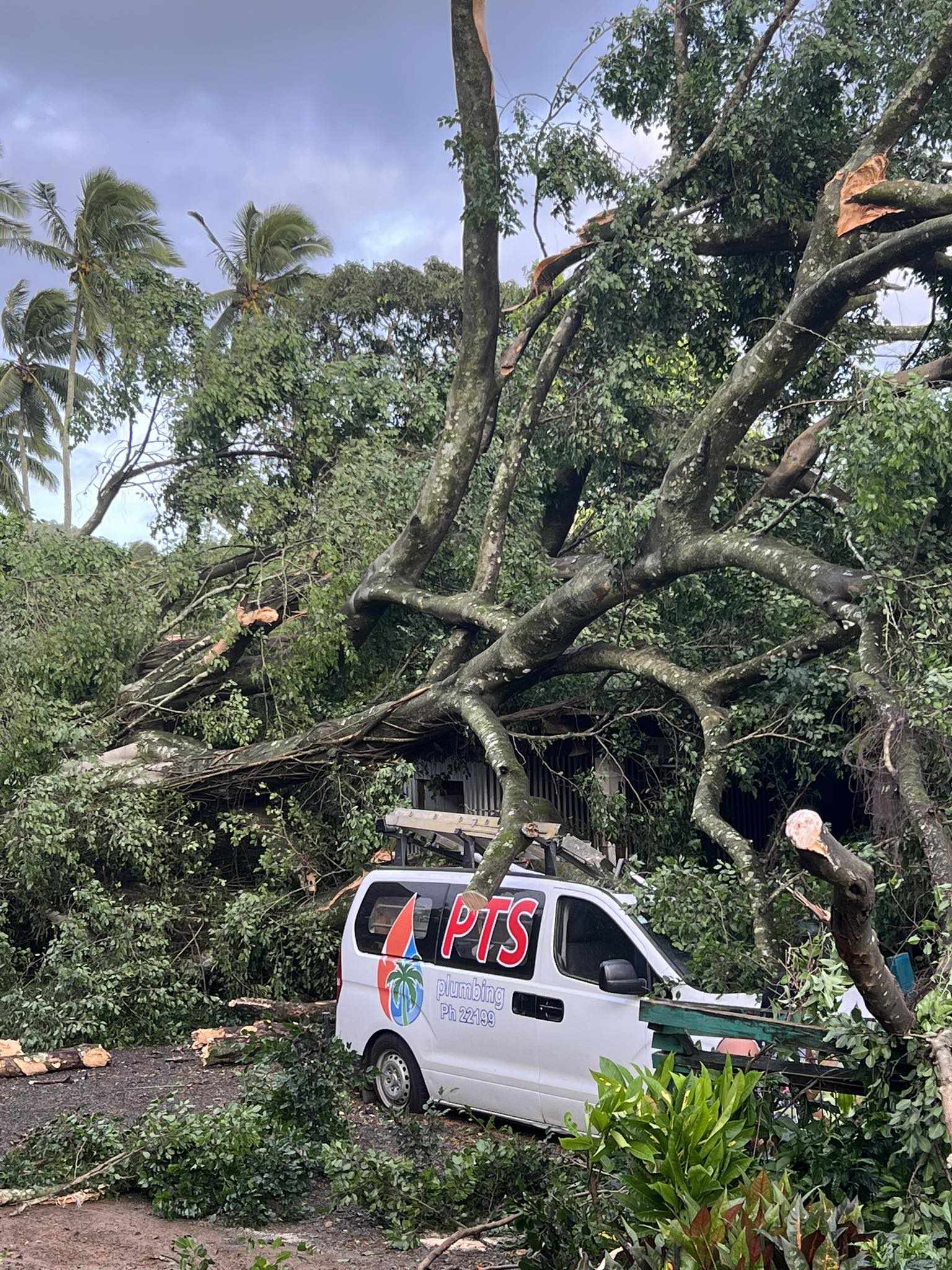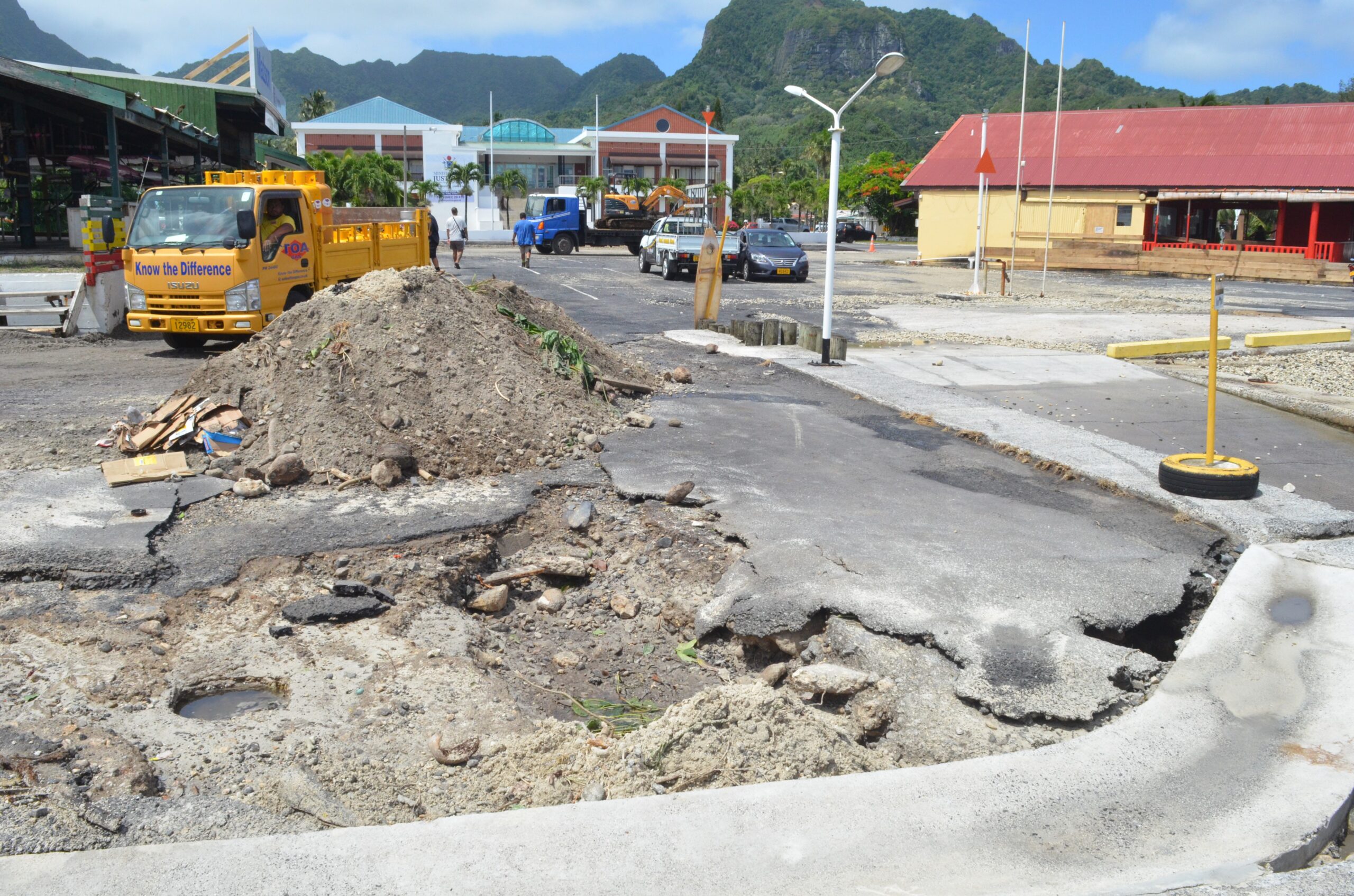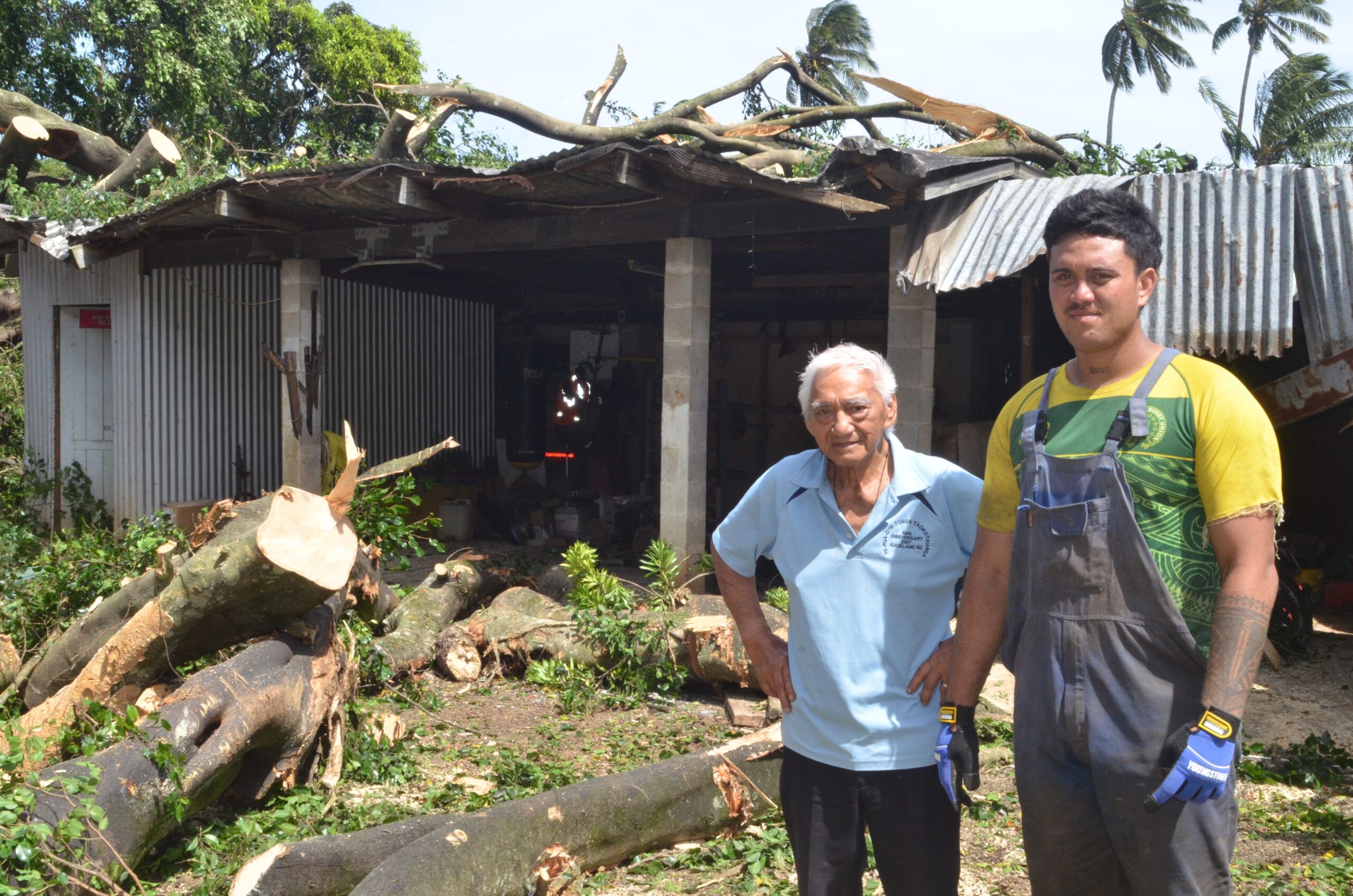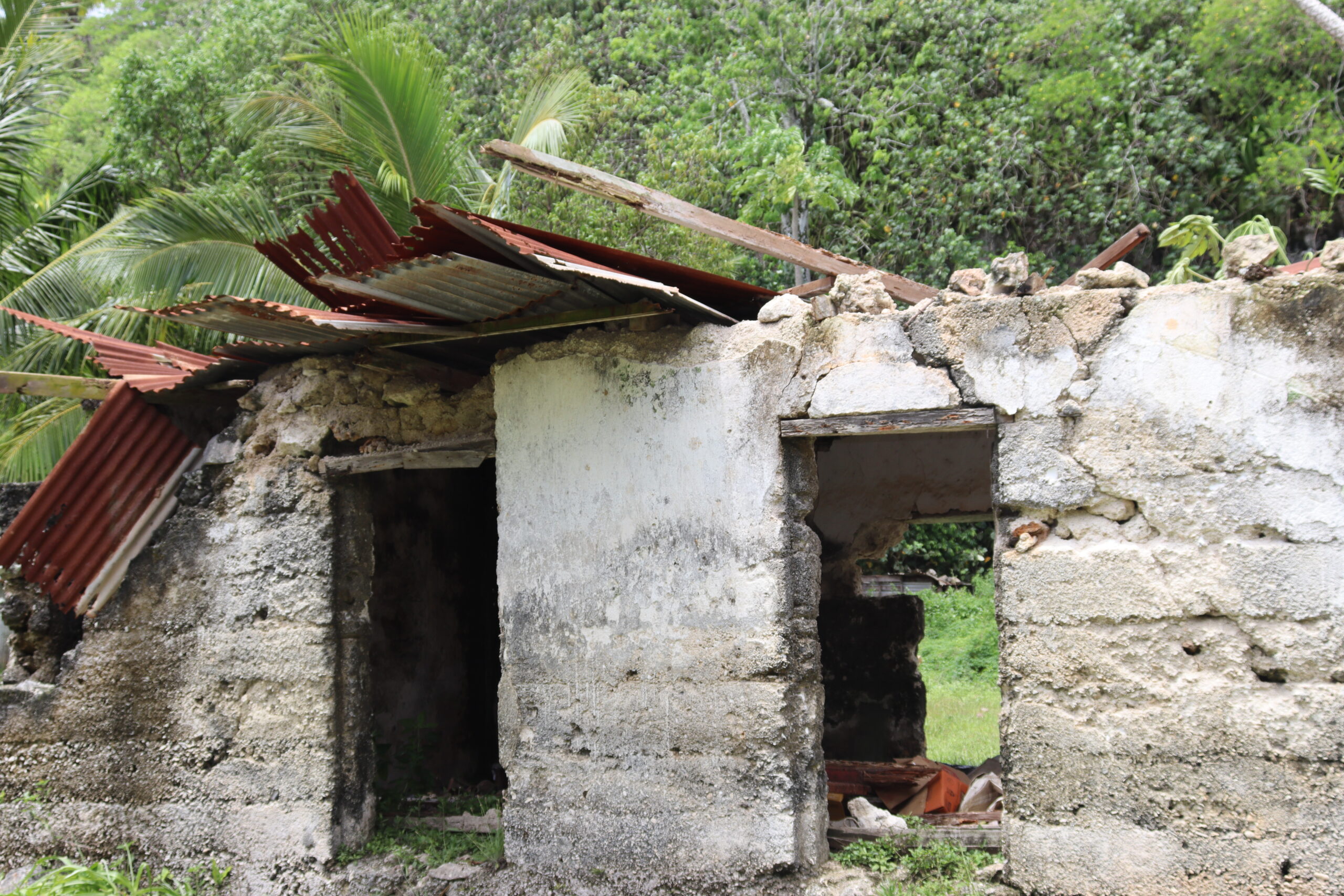Tropical depression brings rain, wind, and minor damage to Southern Cooks
Saturday 17 February 2024 | Written by Melina Etches | Published in National, Outer Islands, Weather

A strong gust of wind early yesterday morning toppled a treasured 32-year-old evergreen tree, damaging a nearby parked car. SUPPLIED/24021636
Tropical depression brought heavy rain and strong winds to the Southern Cook Islands, causing minor damages and prompting school closures.
Like a smile in the sky, the sun beamed down yesterday morning, clearing the sky of gloomy clouds, rain, and gusty winds.
However, schools on Rarotonga closed yesterday in response to the aftereffects of the tropical depression that brought heavy rain and gusts of wind over the Southern Cook Islands.
The consistent rain since Thursday afternoon continued throughout the night, accompanied by strong gusts felt from 3am in some areas around the island that continued through to 6am Friday morning.
Fallen trees, one of which smashed onto a garage roof and a car, fallen debris on roads in Nikao (northwest area), sea surge at the seawall which prompted its closure overnight reopening yesterday morning, damage to the tar seal at Avarua Harbour and surge at Trader Jacks, and high seas reported at the Avana Bridge area were some of the damages sustained from the tropical depression.

A sea surge has destroyed a corner of the tar sealed asphalt near the entrance to Trader Jacks at the Avarua Harbour. MELINA ETCHES/24021616
Thankfully, there were no reports of serious injuries.
Eighty-six-year-old Papa Tangi Kapi in Ruatonga woke up yesterday morning to find his treasured 32-year-old evergreen tree no longer standing.
At about 5am, the mammoth tree fell over, its trunk and branches reaching across to his garage and sprawling out over 30 metres onto the neighbouring taro patch.
Unfortunately, the tree also smashed onto his son’s car.
“It fell on the garage and wrecked my son’s car and he’s angry because he’s always wanted to cut that tree down … but I liked it because of its shade,” said Kapi.
“I felt the strong southerly wind which is always a danger for that tree and usually break up the branches – that’s all it does, but now it has pushed the whole tree down.
“I never felt that strong wind because we were all right inside the house.”
Kapi said he had received the tree sapling in a small pot.
“I just put it there and it just grew.”

Eighty-six-year-old Papa Tangi Kapi with his great-grandson Adyn Kapi. MELINA ETCHES/24021613
His great-grandson Adyn Kapi said the tree was “definitely” older than he was.
“That tree was already there when I was born so I know it was 32-years-old,” said Aydn.
Newly appointed Deputy Prime Minister and Member of Parliament for RAPPA (Ruatonga/Avatiu/Palmerston/Panama/Atupa), Albert Nicholas, who was doing his rounds in the district, stopped by to check on Papa Kapi and the progress of the crew who were hard at work cutting the tree into pieces and clearing the area.
“We’ve had a couple of these trees come down in this area, this is the biggest that has fallen, these trees have shallow roots that spread out on the top of the ground,” said Nicholas, who is also the Minister for Infrastructure.
He was pleased to say that none of the two big streams in his constituency overflowed.
However, Nicholas reminded people that the cyclone season is not over: “Listen to the weather warnings and be vigilant.”
Sea surge washed up through the deck of Trader Jacks and gouged out a corner spot on the outside tar seal, lifting the seal. Staff were all hands-on deck in the morning, prepping the restaurant for business as usual – opening at 2pm in the afternoon.
On Mangaia, the school had already closed for two days due to strong winds.
School teacher Anaseini Pokino said staff at Mangaia school were advised to move all school resources to a safe area away from windows and ensure everything was secure.
Mangaia school principal Michael Papatua said: “During such time, we have a safety-first policy. We been monitoring the weather updates coming from Met office and also waiting for confirmation with the Ministry of Education.”
Pokino said that on Thursday, Mangaia experienced light to moderate wind and showers, with nothing drastic happening until that evening.
Yesterday morning (Friday), “we felt more of the aggressive wind and rain ... breaking trees - basically giving the trees a good trim,” Pokino said.
“Most houses held their ground, but the old, vacant, run-down houses are the ones that pose a threat to people’s lives as the winds could have easily blown rusty iron roofing in any direction.
“By 10am, the grey clouds shifted, and by 12pm, the sun started shining through. Now, we have to clean up,” Pokino told Cook Islands News yesterday.

Most houses on Mangaia held their ground, but the old, vacant, run-down houses posed a threat to people’s lives as the winds could have easily blown rusty iron roofing in any direction, says island resident Anaseini Pokino. SUPPLIED/24021624
Mangaia resident Ngametua Pokino said: “In the past we have experienced similar situation, cyclones following the route it did today (Friday) entry from Rarotonga and existing further south - through us.”
“No major upheaval ... just more cleaning now.”
An Atiu resident said everyone was fine and that there was no damage to houses, although some plantations were affected by the winds and rain.
Mauke also appears to have avoided any serious damage.
Air Rarotonga operated their normally scheduled flight yesterday afternoon.
Meanwhile, several severe weather warnings for parts of the Cook Islands were cancelled yesterday, according to the Cook Islands Meteorological Service.
Cook Islands Meteorological Service’s operation manager Manea Bates told RNZ Pacific: “We have had a few branches and things on the road, and even the seawall was closed during the period the tropical depression passed over us, and we had some pretty big waves hit our town wharf, the Avarua wharf.”
Bates said from Rarotonga, the tropical depression then moved to the nearby small island of Mangaia.
In the final special weather bulletin for the Southern Cook Islands, the tropical depression TD10F was moving southeast and further away from the group.
Bates said the system no longer posed a threat to the Southern group.
Two to three named cyclones have been forecast to pass through the Cook Islands this tropical cyclone season. The peak of tropical cyclone activity in the Cook Islands is usually from December to February, according to the Cook Islands Meteorological Services. The tropical cyclone season runs from November 1, 2023 to April 30, 2024, and New Zealand’s National Institute of Water and Atmospheric Research (NIWA) expects elevated activity or risk in the Northern Cook Islands.














































